Where To Buy Bitcoin for God? Eternal Values for Bad Ideas
Reading the Bible for money and selling your social media to Odyssey ICO, saviours of refugees that have forgotten about their roadmap and guardians of the environment that have a ready-made exit scam and are speculating in carbon credits. Nothing is sacred for fraudsters.
The idea is a bombshell. You read the Bible and get tokens, you subscribe to communities to the glory of God – even more tokens, and if you share Divine Content on social media, you’ll become a token magnate. You can use the currency you’ve earned on the exchange by trading it for ETH and BTC. Or for charitable purposes, donating it to churches and hospitals.
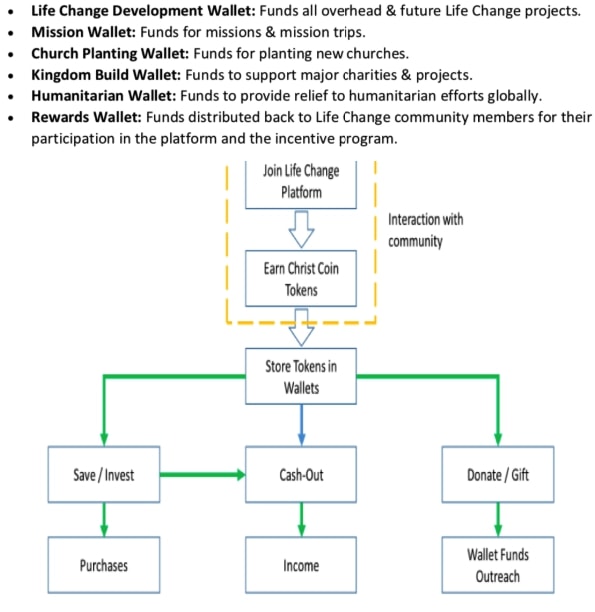
All in all, the Christian enthusiasts wanted to raise around $22.5m. They planned to start distribution in the community (hey, auntie, buy some cookies) and then hold as many as 3 ICO rounds.
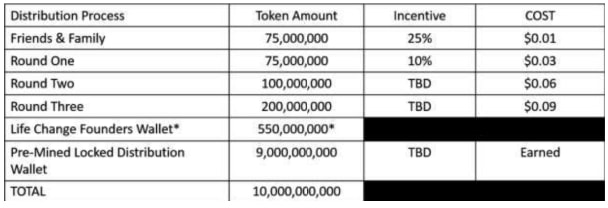
The team had a really serious roadmap.
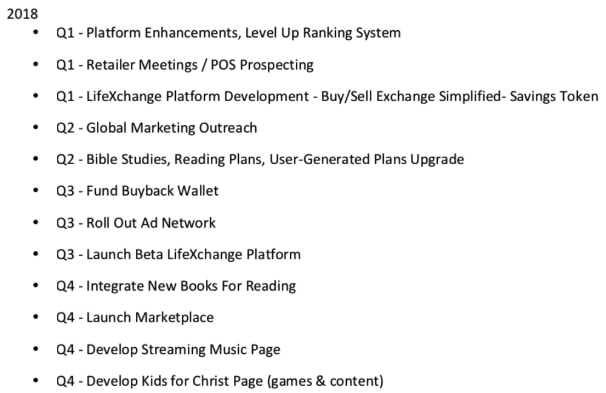
Then came the ICO and it was all over. The website of the Christian startup shows they’ve only raised 16 ETH. The believers took it hard and left to await the second coming of the Saviour. The project’s social media pages started to promote ICO Odyssey. While the team, including the cofounders, turned out to be fake.
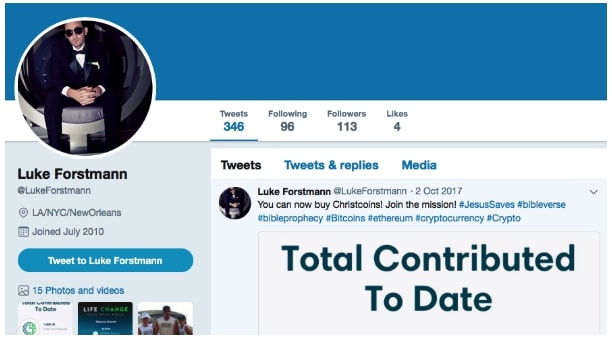
“And God said, Let us make man in our image, after our likeness: and let them have dominion over the fish of the sea, and over the birds of the heavens, and over the cattle, and over all the earth, and over every creeping thing that creepeth upon the earth…” And over the believers!
A startup that is concerned with the problems of refugees. It’s a tough and sad topic, but a trendy one. Here’s a video that tells us why we should invest in ExsulCoin. We should immediately say that they’ve crammed a lot into it, although they never really explain how it will make the world a better place. Cryptocurrency donations to refugees – all right. You choose a respectable family and help them without involving all sorts of corrupt organisations (the creators of the startup say that around the world 500 billion dollars are spent on refugees each year). The tutorials are equally noble and helping with employment is priceless. The problem is that all of this can be achieved without the services of ExsulCoin and its token. What’s more, the whole thing smacks of discrimination. Could a person forced out of their home by war that has internet access (the project’s platform can’t work without it) really not find a job on the many specialist websites made just for that purpose? Or learn about the latest French literature from an online textbook? Or receive a decentralised donation in Bitcoin? In short, it’s like reinventing the wheel, and a useless wheel that won’t go anywhere at that.

Only 5% of the issued tokens were available during the ICO. The rest have been left to ensure operations of the platform and the “stability of the token exchange rate”. That’s some unreal bullshit right there. It looks more like the traditional Revain giveaways that further devalue an already worthless token.
The CEO positions himself as a sophisticated rich kid with a degree from Harvard.
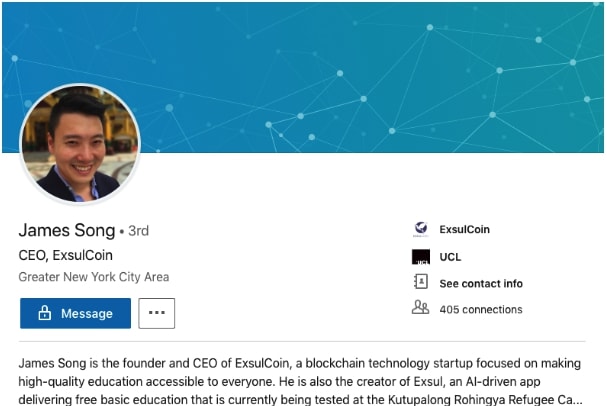
However, Google can only find Song Industrial, which allegedly built a factory in Uganda, in new articles about Song and his startup. His FB page is full of kids from poor neighbourhoods in Myanmar. While the project’s social media pages lie in ruins like a war-torn city. He also runs the startup’s Telegram channel himself, where he sometimes writes about what’s going on. The fruits of his labour aren’t too impressive though – measured both in dollars and followers.
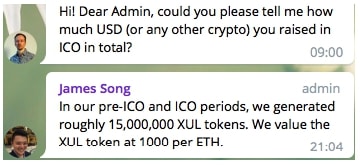
But if you do some more Googling, you can find this here wonderful investment fund from the US. It paints a picture about how noble they are and how they want to get Myanmar off its knees, but there’s no proof. The company’s legal address leads us into a dark and deserted neighbourhood.

Its LinkedIn profile helps us to find the mysterious Miss Kat Song, who presents herself as a cofounder of ExsulCoin despite the fact she isn’t mentioned in the whitepaper. We are also bothered by her Twitter (a load of reposts and followers, 0 reactions), work with the shady cryptofund Satoshi Capital and an ICO she advised alongside shitcoin master David Drake. This looks like a scam too – 25 years in the industry, AI, machine learning and other waffle.
Anyway, fuck that, let’s keep moving. The content manager specified in the whitepaper is pretty hot stuff but her social media pages make no mention of her cooperation with the project. Which is bad.

Although we would also burn our bridges with a startup that forgot about their own roadmap.

The guys have neither got a listing on exchanges, nor launched the ExsulCoin Platform. You have to feel sorry for the refugees. If the wars, natural disasters and other crap weren’t enough, now more scammers are here to try to cash in on them. Burn in hell, you bastards!

Have you ever wondered how you can save the planet? How to protect it from holes in the ozone layer, global warming and the zombie apocalypse? If not, now is the day to start. You don’t even have to tear off the office shirt that is concealing your superhero suit. It’s enough to buy some Climatecoin tokens. Come on, dudes, take this message at face value and let’s con some lemmings out of their money.
The idea behind the startup in brief:
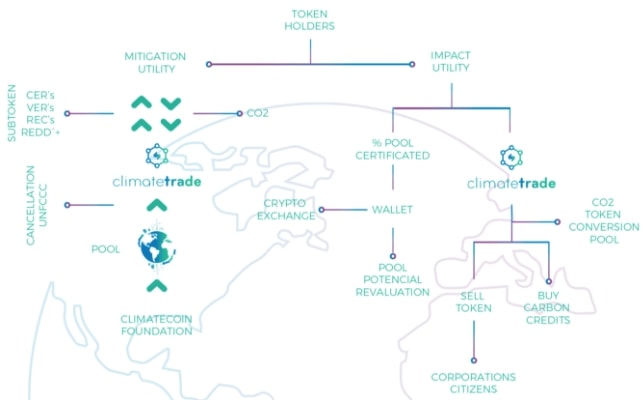
The company has issued CO2 (ERC-20) tokens, whose price will depend not on the crypto market, but on the cost of one carbon credit. In other words, a permit to release 1 tonne of carbon dioxide into the atmosphere (currently worth $8). Token buyers can use them for their own purposes (to build steelworks, for instance) or sell to someone who needs them. The Climatecoin carbon pool has been created in order to spend the proceeds from the credits on creating more environmentally friendly technologies. One day, they will take all the credits off the owners of heavy industry and cover the Earth with wind turbines and solar panels.

Therefore, the team has decided to spend half of the money raised from the ICO on carbon credits. The rest is for marketing, the team, administration and unforeseen costs. As for the business model, it’s simple as ABC. Who the fuck needs Bitcoin to moon if carbon dioxide is growing in price?! Sensational. Mr. Maduro is crying somewhere in Venezuela 🙂
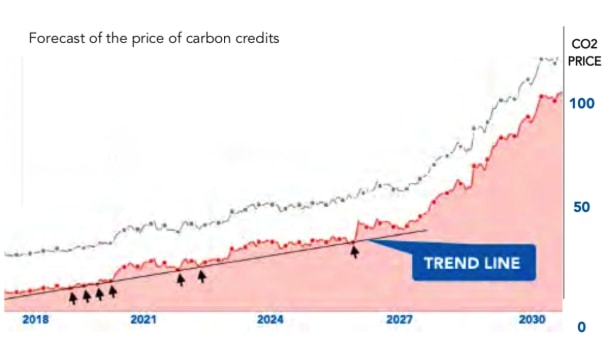
The CEO and cofounder of the project José Lindo looks like a person who cares about the planet. Almost all of his projects are linked to protecting the environment. In his introduction to the whitepaper, he talks about the fact that earthlings will simply not have enough time to spend their money before environmental disaster strikes. As in, it’s time for the whole world to make a sacrifice for the salvation of mankind.
On the other hand, the cofounder James Hart is a serial ICO adviser and a frequent founder, cofounder and manager. Let’s look at PAL Capital, the company he founded 22 years ago. Here’s a list of its clients. Or Broadway Asia, which he is linked to through his wife, the founder (it’s only on LinkedIn we find out that he’s the manager/director). Or even Arcona ICO, which raised 3.1 million of its $25m hard cap. The project’s Telegram channel looks like a get-together for fantasy lovers. Tanktwo is an Estonian electric car project that is also trying to bolt on a blockchain.

And there’s ICO Drop Deck, which is said to have sold $4.2m worth of tokens, but apparently turned into an exit scam, seeing as how the social media pages aren’t being managed and the website is down (there’s no listing on exchanges either). So the guy doesn’t have much credibility. The main thing is to pay up on time.

The boys are keeping quiet about how much the ICO raised, although its time limits were just a formality. It started last December, but it is still possible to buy now. By the way, the coin’s exchange rate differs strongly from one exchange to another and it is more expensive to buy than to sell.
The startuppers prefer offline events to social media. They buy sponsorship and tell everyone how to save the planet.

Their social media is weak, Github likewise. Tumbleweed since the end of October.
We can draw the following conclusions from the example of these 3 ICOs:
Right: reading the Bible for free, helping refugees and the disadvantaged, recycling and driving cars with eco-friendly engines. Or don’t do any of that, but just don’t…
Wrong: investing in projects that lure you in with the Holy Scripture, charity and gambling on the cost of certificates for polluting the environment.
The road to hell is paved with good intentions. In the world of blockchain, hell is a place where all believers in new technology get completely ripped off.
Tell us what you think about our investigations in the comments. If they still aren’t enough for you, we can always do some research on an ICO that has caught your eye. For free, honestly and from the heart. Together we will prevail!
In blockchain we trust!
Don’t miss any new material:





